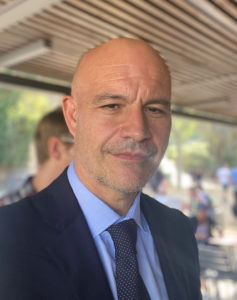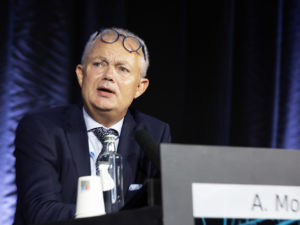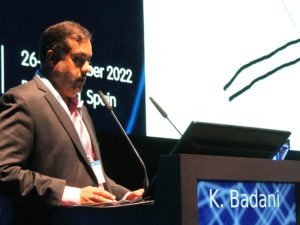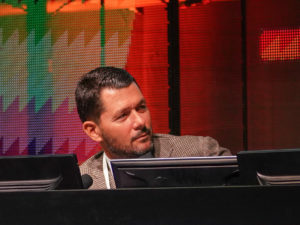The EAU Robotic Urology Section will be hosting its 20th annual meeting in Florence on 13-15 September 2023. ERUS23 is Europe’s biggest event dedicated to robotic urology, a highly dynamic surgical meeting. Its scientific programme will focus on practical instructions on robotic surgery through live surgery sessions, case discussions and State-of-the-Art lectures by key opinion leaders. There will also be opportunities for industry sessions, ESU Courses and a Technology Forum and, naturally, a unique opportunity to meet colleagues in robotic urology from across the world.
The ERUS meeting is also known for its special attention to the needs of younger urologists with a special Junior ERUS-YAU programme. This year will also feature a day-long EAUN programme for urology nurses, including specialised hands-on training. Continuing the new direction of ERUS22 in Barcelona, ERUS23 will have even more of a focus on (live) surgery than past ERUS events. It is set to feature both oncological as well as non-oncological urological surgery since the latter has taken an important position in the robotic urology field.
Prof. Andrea Minervini of Florence’s Careggi University Hospital spoke to us about hosting this year’s ‘anniversary’ event.

“It’s a true honour and privilege to host next ERUS meeting in Florence for its 20th edition. The ERUS meeting is part of the annual ‘to do list’ among the many international congresses. I attended many previous editions, as organised by Profs. Mottrie and Breda, the ERUS board and, of course, all of the many host centres. Obviously, we hope not to be outdone. In this regard, the aforementioned anniversary comes just at the right time, since robotic surgery is experiencing an unprecedented revolution.”
“After almost two decades, there are now new contenders in the field for the leadership in robotic surgery, with new platforms coming to the market and aiming to overcome the historic monopoly. As such, we are witnessing the introduction of new solutions and new technical devices in the various robotic platforms, meaningfully disrupting the established robotic surgery landscape. At ERUS23 we will have the possibility to see in action and evaluate how different platforms perform in numerous urological procedures. It is definitely an event not to be missed for all robotic surgeons.”
Hot topics at ERUS23
“Of course, we will not only talk about oncological surgery. Benign pathology, reconstructive surgery and kidney transplants will have a prominent place as well. Head to head comparison sessions about several hot topics in robotic surgery are also planned. Finally let’s not forget that the training is also an important feature when talking about robotic surgery. In this regard, we will also talk about how to tailor and improve surgical training in our robotic centres.”
“Surely the event will be further enhanced by the possibility of being able to see different robotic platforms in action in the same surgical procedure. Attendees will be offered many surgery sessions in which, thanks to the parallel screen set-up, it will be possible to directly compare different robotic platforms working simultaneously.”
- Registration is now open! The discounted early fee ends 14 June.
- Abstract submission is currently open and will close on 14 June.
Two decades of robotic expertise
“Robotic surgery has experienced a profound transformation in these twenty years. There has been a significant interest in enhancing robotic surgery in the past two decades in an attempt to reduce morbidity, expedite recovery and decrease hospital stay.”
“From the first multiport robots, we have moved on to the latest generation consoles, up to the introduction of single-port platforms. In this scenario, new robotic platforms have come out on the market, shuffling the cards on the table.”
“What will we see in the near future in my opinion? Surely there will be a further push towards miniaturisation and reduction of costs, also due to new competitors on the market. Of course, let us not forget that the higher the adoption of robotic platforms, the greater the robotic training should be, in order to avoid complications related to use of robotic assistance by surgeons without the necessary proficiency.”
“Second, the rise of remote surgery and telesurgery, has seen a surge in popularity following rapid advancements in computer technology, telecommunications, and robotics. I am sure that this will be developing rapidly in the next few years.”
“Finally, also bed-side assistance for the main surgeon could dramatically change in the very next future. Autonomous robotic technology has recently been developed, for example the Smart Tissue Autonomous Robot (STAR), which has been used in porcine models to perform autonomous intestinal anastomosis. Surely, further technological advances are expected to come into the market in the next decade. ERUS23 will of course be showcasing the very latest trials and developments for those interested in where the field is going.”
Live Surgery in Florence
“Ours is the highest volume centre in Italy for all types of robotic surgery and also most of the benign pathology. As such, our staff is highly professional and quite used to hosting live surgery events. Obviously, a large-scale congress such as ERUS represents a major event and I am sure that everyone in my department will do their best to offer the best experience to both hosted surgeons and those attending the meeting. Of course, it should be considered that the specialisation and the commitment of the staff both rise as the number of different robotic platforms available on the market increases. We are preparing to offer the best work experience possible.”
“I think Florence as a host location needs no introduction. It really is the cradle of the Renaissance. Hosting this congress in September in Tuscany offers all the premises to provide an unforgettable all-round experience, also outside of congress hours. But I don’t want to give spoilers. Come to ERUS23 and see it with your own eyes!”
Important deadlines:
- Registration is now open! The discounted early fee ends 14 June.
- Abstract submission is currently open and will close on 14 June.





